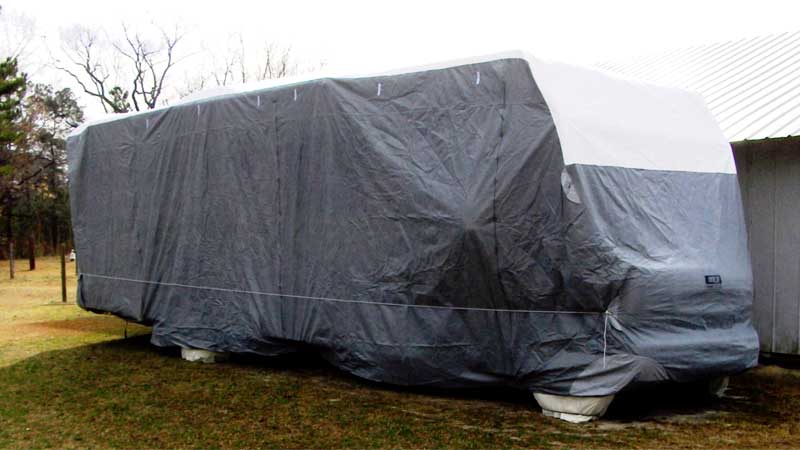Here are my top five RV storage tips.
These RV storage tips do not cover everything you need to be concerned about when storing your RV but it’s a good start. RV storage tip number one: when preparing the unit for storage, I always wash the exterior and clean the interior thoroughly. Make sure all awning fabric is clean and dry before stowing the awnings.
This is a good time to inspect all roof seams, body seams, and window sealant for any cracks or openings that would let water penetrate the surface. Water can get in the smallest opening so it’s important that you really inspect all of the sealants. Consult your RV owner’s manual or RV dealer for sealants compatible with any surfaces you are resealing.
RV storage tip number two: the best storage scenario is to store your RV indoors or under a covered area. But that’s not always possible. If the RV is stored outside, avoid parking it under trees or in areas where grass and weeds will grow. The sun and other elements can damage your RV. The best investment you can make for an RV stored outside is a quality RV cover. The cover should be made of a breathable material to help promote air circulation and to prevent mold and mildew.
RV storage tip number three: inflate the tires to the manufacturer’s recommended pressure. Place some type of blocking between the tires and the ground. Make sure the blocking is larger than the actual footprint of the tire to prevent damage to the tires. Cover the tires to protect them from the sun and harmful UV rays.
RV storage tip number four: inspect the underside of the unit thoroughly. Look for anywhere mice or other rodents can get inside and seal these areas using silicone or a spray foam product. You can use mouse and ant traps in and around the unit or use a product like Sniff ‘n’ Stop to prevent mice from nesting inside the RV.
Remove all consumables that would attract mice and other rodents and remove all perishables and anything that can freeze. Defrost the freezer compartment and clean the refrigerator. Place some baking soda inside to absorb odors and leave the refrigerator doors propped open.
RV storage tip number five: make sure the batteries are prepared for winter storage. Batteries self-discharge when in storage. A discharged or partially charged battery will freeze much faster than a fully charged battery. Check the batteries’ state of charge every month and charge batteries that are at or below 12.5 volts for 12-volt batteries or 6.25 volts for 6-volt batteries. Check the electrolyte level in lead acid batteries and add distilled water as required. You can plug the RV in once a month for about eight hours to keep the coach batteries topped off or use a product like Battery Minder to keep batteries topped off.
In addition to these RV storage tips, if it’s a motorized RV I recommend you fill the fuel tank prior to storage and add a fuel stabilizer, run the engine and the generator long enough to get the stabilizer through the entire fuel system. It’s also a good idea to change the oil and oil filter on the engine and generator prior to storage. Acids accumulate in used oil and can corrode engine bearings.
I mentioned at the beginning of the video that these tips don’t cover everything about storing your RV but if you winterize your RV and follow these simple storage tips, your RV will be ready for the upcoming camping season next spring.
Happy camping.
Happy camping from Mark Polk of RV Education 101
To learn more about how to use your RV,
Happy RV Learning,
Mark Polk, your trusted source for RV education

